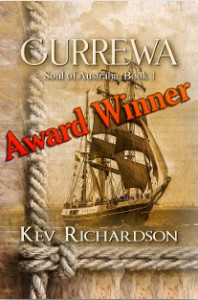Kev richardson
WingsPress Publishing
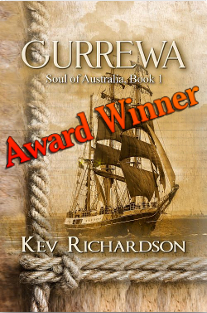
Gurrewa
Its 1st edition, Gurrewa, was awarded a Finalist Degree in the International Epic Awards of 2003—the first novel on the Founding of White Australia told through convict eyes since Marcus Clarke’s For the Term of his Natural Life (1870) – Gurrewa tells the story of Australia’s first white settlement and the Aboriginal demise told both through the eyes of a convict lad learning about life, people and values, and the eyes of the Sydney Cove Aborigines. It empties the vacuum cleaner with which modern Australians were at last cleaning under the carpet where, for generations, the dust of truth was swept.
Adam, a London gutter waif, his only skill the art of street survival, accepts his world in happy ignorance. He evaluates humanity not according to precepts of social expectation but of experience. He seeks tenderness and succour in an environment that provides neither. In the horrors of the hulks and transportation, his emotions find outlets in dreaming, in torment, in love, in adventure. From his first days at Sydney Cove, he lives the shame of a new nation’s founding. Threatened securities become shattered and he can but dream of a world where there is compassion and dignity.
The Aborigine too, finds his securities shattered, faced with the dilemma of the painful, terrible realisation that his heritage is crumbling.
Disparaged that in the convict heart is only shame for his world, Adam discovers in the black man’s culture, solace and dignity, yet the shame will not die. Alongside the Aborigine, he takes up the fight against the white advance—a fearful, emotional war that cannot be won.
5++ Stars ! ![]()
![]()
![]()
![]()
![]()
![]()
![]()
I wept for Adam Ashby, not because he lived such a degrading, despairing life as a lowly convict, but because he had finally discovered acceptance and respect by the Aborigines of New South Wales, only to be hunted down by his own people. He had bolted into the wilds rather than be flogged for his latest crime. This is a poignant story of a boy who in his teens searched for a kind and gentler world where a person could be loved for simply being himself. Instead, he is jailed and thrown in with hardened criminals and military men who greedily seek power over their charges. In spite of what this criminal environment has in store for Adam, he nonetheless survives. Yet it is his searching for empathetic love and respect that carries him into manhood. And Oh, that ending! It hit me right in the gut. Masterful stuff!
… JoEllen, Conger Books Reviews (USA)
~ * ~
5 Stars ![]()
![]()
![]()
![]()
![]() for Kev Richardson’s GURREWA !
for Kev Richardson’s GURREWA !
This third edition continues emptying the vacuum-cleaner with which modern Australians are at last cleaning under the carpet where for generations, the dust of truth was swept. It is the first intensive study of what happed in Sydney Cove, told through convict eyes, yet with added meat, since Marcus Clark’s masterpiece ‘For the Term of his Natural Life’ in 1870. It delves too, into the Aborigine facing the terrible realisation that his heritage is crumbling. Gurrewa gives us a remarkable insight into the perturbations of both the convict and the black man, for his tomorrows.
… Libbie Abbott, Aussie eBook Reviews
~ * ~
5 out of 5 Star ![]()
![]()
![]()
![]()
![]() – Outstanding
– Outstanding
Gurrewa is an impeccably researched history of Australia’s First Fleet of settlers and convicts. It is told through the mind and body of a fourteen year old London street gamin who is sentenced to seven years for lifting a few articles of clothing. He is sent to labor on the Thames hulks before being transported to Botany Bay.
Richardson skillfully tells the story of convict hardship in stark reality. The reader does not suspect he is being given a history lesson. A lesson few of us have heard. I strongly urge anyone to pick up a copy of this excellently written work.
~ * ~
Gurrewa tells the brutal shame of a new nation’s founding, the plight of convicts, and of Aborigines facing the terrible realisation that their heritage is crumbling. Author Kev Richardson has caught the flavor and pure awfulness of the time about which he writes. His characters are well drawn and believable. Without hesitation I recommend this story to anyone who likes historical or mainstream tales.
… Anne K. Edwards, eBooks Reviews Weekly
~ * ~
Award-winning book revised
Gurrewa, first novel of Australia’s convict history told through convict eyes since Marcus Clarke’s For the Term of his Natural Life in 1870, has just hit the market in its third edition.
An award winner, it details the experiences of convict life when, in 1788, the First Fleet of Great Britain’s wayward men and women set foot in Botany Bay to establish a convict settlement. It empties the vacuum cleaner with which modern Australians are at last cleaning under the carpet where, for generations, the dust of truth was swept.
Adam, a London gutter gamin, his only skill the art of street survival, accepts his world in happy ignorance. He seeks tenderness and succour in an environment providing neither. In the horrors of the hulks and transportation his emotions find outlets in dreaming, in torment, in love and adventure.
From his first days at Sydney Cove he lives the shame of a new nation’s founding. Threatened securities become shattered; he can but dream of a world with compassion and dignity.
Aborigines, too, find their securities dwindling. Adam bolts, to live with and understand the terror amongst them. He takes up the fight against the white advance…a fearful, emotional war that cannot be won.
Dr. Bob Rich (Australian Award Winning Author) 2 August 2018
___________________________________________________________
Note Paperbacks - all titles
- + If in North America, all above is applicable
- + If in Australaia, [email protected]. Greg may have stock and will quote price including mail
- + If in Thailand, [email protected]. Kev will deliver in Chiang Mai, or mail to other areas.
- + If elsewhere, [email protected]. Depending on where you live, Kev may have cheaper prices than from USA, by mailing from his stock in Thailand
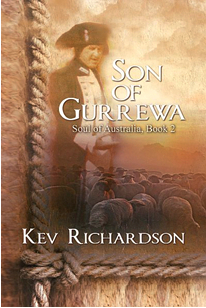
Son of Gurrewa
The second generation of white Australia was a time of rapid growth. With the industrial revolution beginning in Britain, machines began replacing nimble fingers…many of the poor found themselves in a ‘steal or starve’ situation. With Napoleon defeated, countless thousands of British servicemen were demobbed into gutters to join the steal or starve ranks. Britain’s gaols burst at the seams and transportation to New South Wales burgeoned. For free people it became a region of unrealised opportunity as well as for many, incredible luck.
Son of Gurrewa highlights how the convict stigma influenced the social structure through the second white generation…those born to the First Fleet convicts. It was a time of exploration and discovery.
A young man questions, then discovers values essential to finding meaningful satisfactions in such a unique lifestyle. Its telling paints the lives and experiences of real, significant people in that generation of Australia’s history. It illustrates too, how Australia earned its reputations of both Lucky Country and Land of Opportunity.
The sorry hand of fate most-times visits only hardships on a developing community, yet occasionally some pawns in the game of life find Lady Luck lends a hand. The odds for this second generation Adam, fall a little each way.
Son of Gurrewa is a worthy sequel to Award Winning Gurrewa. Kevin Richardson has the unique ability to tell his country’s history as it affects people, by letting his lifelike characters tell it from their own minds in their own words. This preamble on Australia’s convict beginnings makes the reader believe he or she is really there, influenced by the real events of those days. You cannot but help feel part of it!
Libby Abbot, Aussie eBook Reviews
5 Stars ! ![]()
![]()
![]()
![]()
![]()
Adam Ashby of Gurrewa is Kev Richardson’s fictionalized convict-birthed character born to an unwed couple, a ‘bolted’ convict and his ‘colony wife’. Son of Gurrewa represents the second generation of white man’s life in Australia. It tells the real history of New South Wales’ struggles to become more than just an overflow prison for England’s criminals. It is also an excellent portrayal of how Australia earned its reputation as both The Lucky Country and Land of Opportunity.
For those of you who miss the history in your Historical reads, you’ll not be disappointed in this factional account of Australian history, 1790–1820s.
And Kev, I just love the way you throw a good story together!
JoEllen, Conger Book Reviews, USA
Note Paperbacks - all titles
- + If in North America, all above is applicable
- + If in Australaia, [email protected]. Greg may have stock and will quote price including mail
- + If in Thailand, [email protected]. Kev will deliver in Chiang Mai, or mail to other areas.
- + If elsewhere, [email protected]. Depending on where you live, Kev may have cheaper prices than from USA, by mailing from his stock in Thailand
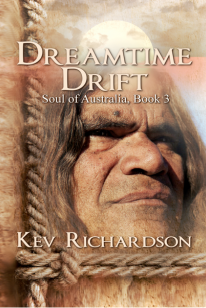
Dreamtime Drift
When the first white people arrived to settle the vast Australian continent in 1788, its Aborigines were estimated to have numbered near one million. The 1900 census figure was 93,000.
Today, the number of full-blooded Aborigines is less than ten thousand.
Dreamtime Drift is set during the years 1824-1830, using recorded history of the first white settlement of the present state of Queensland, to illustrate how neglectful and destructive was the emerging white community, of the country’s Aboriginal people.
First in the Soul of Australia trilogy, Gurrewa, told the beginning of Australia’s white settlement. The first fleet had brought seven hundred and fifty convicts and some three hundred red-coated marines to police them, and officers to administer all of what was, in effect, the world’s biggest prison. It told of the founding through the eyes of both convicts and the displaced Aboriginal people. Son of Gurrewa told of the development during the second generation as further prisons were established, disrupting Aboriginal life and culture.
Dreamtime Drift illustrates the continued devastation of Aboriginal livelihood and culture as increasing numbers of convicts arrived ever northwards from Sydney Cove. It takes the reader into the very heart of the shock, insecurity and helplessness of Australia’s indigenous people as Whiteman bludgeoned his way forward and began the settlement of Brisbane. Aboriginal homelands were to become sheep and cattle grazing properties and countless thousands of acres of wheat and corn.
The Aborigine was not offered the choice of retreat or murder as Whiteman’s frenetic race for more land continued; the realisation but slowly dawned as he suffered the increasing pain.
Dreamtime Drift has been awarded 5 Stars by both Australian and USA award houses.
Dreamtime Drift Reviews
In another 5 Star revelation from the pen of Kev Richardson, Dreamtime Drift tells the dreadful tale of how in early Australia, Whiteman’s frenetic race to grab arable land using hard-labour-convicts to build a prison and farmlands, bludgeon their way at the expense of the Aboriginal people. Struggling under a government striving to build a further dependency in its empire, the native inhabitants fighting to protect their very existence, buckle under the power of the educated invaders. This work takes the reader into the very heart of the shock, insecurity and helplessness of Australia’s indigenous people…
Libby Adams, Aussie eBook Reviews.
~ * ~
5 Stars! ![]()
![]()
![]()
![]()
![]()
Multi-published Historical writer, Kev Richardson found himself truly challenged in his endeavorto locate the Aboriginal voice to weave into Australia’s early history. As is often the case, the indigenous people were without a written language. therefore, the Australian Aborigine’s story could be unearthed from only vocally repeated myths and metaphysical beliefs.
Through the eyes of the gentle natives 1824 to 1830 in Dreamtime Drift, Kev recreates the emotional conflict and mystical beliefs of the peaceful Turrbal and Jagera people. It is a then account of the injustices and savagery inflicted on a gentle race of people by the British invaders; those with little regard for the rights of indigenous people.
This exceptional work truly touched my heart.
What gave me real satisfaction in this historical account of Aboriginal abuse is Banyo’s parting sentiments to the notoriously cruel Captain Logan. It was a fitting and subtle salutation to a man with so much evil in his heart as to be forbidden the right to enter the tranquility of the afterlife.
JoEllen,Conger Book Reviews, USA
~ * ~
The first word that comes to mind from reading Kev Richardson’s historical novel, Dreamtime Drift, is Superb. I highly recommend this third installment of his Soul of Australia series. The amount of research that went into crafting this book is awe-inspiring and astounding. Coupled with being extremely well-written, well-delivered, including a glossary and diagrams, it packs a powerful punch to stay with his readers forever.
Dreamtime Drift tells the story of the demise of the Aborigines in Australia during 1824-1830. They are spiritual, peaceful, self-sufficient hunter-gathering nomads who lived simply and happily. Along came Whiteman to steal their land along with bringing cholera and smallpox to kill thousands.
The story is told through the eyes and hearts of a white sympathizer and an indigenous man. It is so vividly portrayed that you feel you are right there witnessing the struggles and the horrendous slaughter of innocent Aborigines at the hands of British settlers wanting their land and stooping to anything to get it.
My heart was stirred by Richardson’s intense, skillful writing and I will never forget the unique Aborigines and what they stood for – their love, simplicity and spiritual ethics. I highly recommend this work for it is a must read. I look forward to the next one. I learned a lot, grew a lot, and it will stay in my heart forever.
Suzanne Hurley – www.suzannemhurley.blogspot.com
~ * ~
Note Paperbacks - all titles
- + If in North America, all above is applicable
- + If in Australaia, [email protected]. Greg may have stock and will quote price including mail
- + If in Thailand, [email protected]. Kev will deliver in Chiang Mai, or mail to other areas.
- + If elsewhere, [email protected]. Depending on where you live, Kev may have cheaper prices than from USA, by mailing from his stock in Thailand
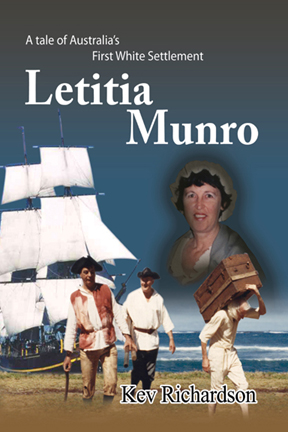
Letitia Munro
A true tale of those who in witless ignorance transform a wilderness into a land of free enterprise and pride. To relieve the pressure of overcrowded gaols, Britain began in 1787, despatching pickpockets, thieves, forgers and other petty criminals over a period of eighty years, to New South Wales. Such was the beginning of the white Australian civilisation. That ancient land became, overnight, the biggest prison in the world.
Letitia was of the First Fleet. Seven hundred and fifty convicts in chains, their military guards and a score of government administrators with no real idea of what they would discover on landing, made their eight month journey half-way around the world. Only slowly and painfully did every soul come to realise the aches, pains and anguish of founding a settlement in a wilderness far from help and succour. For the convicts in particular, it was fear personified.
Illiterate and friendless under martial law, under attack by hostile natives, their role was, by hard physical labour, to carve out a settlement.
Australia’s convict forebears were essentially British in culture, staunchly British in allegiance yet the axiomatic sense of freedom in their descendants was inherited not from British freedom but from British oppression. It was the very ignominy of servitude that cast their blood and guts dignity and bred in them their irrefragable support for the underdog. Determination of purpose, henceforth, developed towards mateship and a flippant attitude to authority. Conventions of class distinction became a barrier to be bested as they cleaved their several paths out of adversity, grasping any chance to create opportunities of easing pain.
So these ‘vagabonds’ became leaders by example in establishing the cultural trends of Australian society. Convicts emerged from their world of oppression and intimidation establishing traits of self-reliance, doggedness and obstinacy of purpose—essential ingredients in creating a culture of initiative and stubborn resolve. They unwittingly established social standards suited to their unique circumstance.
Titia, illiterate and cowed when arrested at nineteen years of age, earning her fourteen year sentence of transportation, was to illustrate latent strengths emerging as she bested her hardships. Many convict records survive in Australian archives and she was one who became unique in Australia’s history as she played her part in establishing the ethos of today’s Australians, living to the grand age, for the times, of ninety. Titia not only saw Australia’s convict beginnings from its day of inauguration at Botany Bay to its day of demise in Van Diemen’s Land, but lived to become its last surviving convict, matriarch to thousands of descendants.
In her long and significant life there was nothing to suggest that the sum total of the lives, experiences and fortunes of her and her convict friends and families were unique. Each was broadly typical of the 162,000 convicts transported to Australian shores 1788 through 1868 to found a nation, a culture, and a unique heritage.
5 Stars! ![]()
![]()
![]()
![]()
![]()
Kev Richardson, a 6th generation descendant First Fleeter, continues his authentic historical account about the thousands upon thousands of convicts imprisoned on New South Wales—a land that not even the king himself knew had too little fresh water to drink, or sufficient tillable soil to support the hoards of convicts he sent. Letitia never realized when sentenced for stealing a partial bolt of cloth, that she would become a memorable part of Australian history.
It’s like no history I’ve ever read. The voice in this work carries the reader right into the trying times of convict life—I found this book an informative account, written the way I like to read history. Richardson makes you live the part of the suffering and struggles of the times.
I highly recommend it.
…JoEllen, Conger Book Reviews, USA
……..***……..
5 Stars! ![]()
![]()
![]()
![]()
![]()
Letitia Munro is a work deserving of the highest awards in Australia’s history. Richardson has studied his nation’s convict history from A to Z, is a Past President of The First Fleet Fellowship and a Past Secretaryof The Descendants of Convicts Inc.
This wonderfully presented true history read will keep you spellbound!
Libby Abbott, Aussie eBook Reviews
Note Paperbacks - all titles
- + If in North America, all above is applicable
- + If in Australaia, [email protected]. Greg may have stock and will quote price including mail
- + If in Thailand, [email protected]. Kev will deliver in Chiang Mai, or mail to other areas.
- + If elsewhere, [email protected]. Depending on where you live, Kev may have cheaper prices than from USA, by mailing from his stock in Thailand
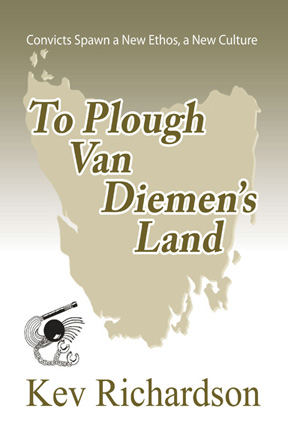
To Plough Van Diemen’s Land
The first white Australians were convicts, pickpockets, thieves, forgers and other petty criminals despatched from bulging British gaols.
Letitia Munro told the true tale of those who in witless ignorance as they landed on the naked shores of Botany Bay, began transforming a wilderness into a land of free enterprise and pride.
Following generations of convicts arrived to marry the sons and daughters of the first, to together carve notches in the culture they were unwittingly developing. Conventions of class distinction became a barrier to be bested as they cleaved their several paths out of adversity, grasping any chance to create opportunities of not only easing pain but laying foundations for an honourable future.
These ‘vagabonds’ became leaders by example in establishing the cultural trends of Australian society. Convicts emerged from their world of oppression and intimidation with established traits of self-reliance, doggedness and obstinacy of purpose, essential ingredients in creating a culture of initiative and stubborn resolve. They unwittingly established social standards suited to their unique circumstance. Influenced more by whips and chains in servitude than by examples set for them, they became perforce, overt, their opinions forthright and even blunt, traits adopted by their children.
Society values, however, keep changing and the majority had to face the realisation that the stains of convict blood continued to seep through the pages of their life and must be hidden. A great dilemma was visited upon the people, causing considerable havoc within families. Must parents lie to their children?
To Plough Van Diemen’s Land takes chosen true characters through this life, up to the cessation of convictism. The name of the colony was then changed from Van Diemen’s Land to Tasmania in the hope of expunging the convict image.
5 Stars ![]()
![]()
![]()
![]()
![]()
Kev Richardson has a way of introducing the reader to each of Letitia Munro’s family, making the history in the late 1700’s and early 1800’s come alive.
The Van Diemen’s Land name was changed in an effort to hide the social guilt of inhumane suffering, starvation, deliberate brutalities, and unpardonable cruelties dealt against prisoners whose misdeeds were often only crimes of ‘desperation in surviving hard times’. It was such beginnings that established the convicts’ loyal code against their captors, formulating the heritage of ‘bonded relationships’ in today’s Australians.
I highly recommend Kev’s historical tales. He brings history to life.
…JoEllen, Conger Book Reviews USA
……..***……..
5 Big Stars! ![]()
![]()
![]()
![]()
![]()
Second in the Letitia Munro trio of true-life tales of Australia’s founding as the world’s largest prison.
Convicts despatched from Britain’s bulging gaols served out their sentences in an ancient land, wresting it from Aborigines, that it be turned over to agriculture and sheep-grazing. This episode tells of the second generation experiences, hardships, loves and heartbreaks as they unwittingly forged a new ethos. Mostly illiterate and lacking skills, some failed at farming while others succeeded, unaware of the social taboos being woven into the fabric of the nation’s spawning culture.
When the sins of fathers became beholden on them as society values changed, must they deny their very heritage?
Richardson has a careful and strangely unique way of telling how such strange beginnings were blessed upon a land that had never known white-man needs. Go for it!
Libby Abbott – Aussie eBook Reviews
Note Paperbacks - all titles
- + If in North America, all above is applicable
- + If in Australaia, [email protected]. Greg may have stock and will quote price including mail
- + If in Thailand, [email protected]. Kev will deliver in Chiang Mai, or mail to other areas.
- + If elsewhere, [email protected]. Depending on where you live, Kev may have cheaper prices than from USA, by mailing from his stock in Thailand
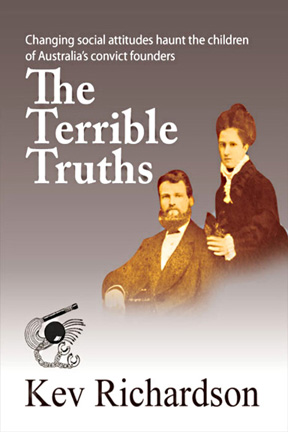
The Terrible Truths
When their known world did an about-face on Convictism, declaring the very purpose Australia was founded, it created quite a dilemma throughout the growing colony. It was declared a mistake, that to take a place in society, the dreadful truths of having convict blood flowing in ones veins, was itself a heinous crime. Parents must lie to their children—hide The Terrible Truths for ever.
The authorities declared that the very knowledge that Australia was founded as the biggest prison in the world, that all Australians must cast from memories, how the very foundation of the Australian ethos was spawned! Even documents referring to it were destroyed—a very culture was being denied!
We might today ask how parents, mothers as well as fathers, explained away the scars left from wrist and ankle chains, and of whip-lashes on their backs.
Could the stigmas of having convict blood flowing though one’s veins, remain forever buried?
In The Terrible Truths, Letitia Munro’s descendants, in this true tale of an Australian family, struggle to find answers.
5 Stars! ![]()
![]()
![]()
![]()
![]()
I must agree with Australian historian Kev Richardson, a proud sixth generation ‘First Fleeter’, that denying the terrible truths of convictism and its atrocities, only made today’s Australians stronger for realising how their forebears clung together to cope with intolerance, bigotry, and hypocrisy of the times.
I found reading about the true history of the 1800’s in Australia, an eye-opener.
Here is a modern day author bravely disclosing the terrible truths concealed behind the recorded history of the ancestors transported into a living hell, and how they really lived and loved. I highly recommend this series to all history lovers. This book will open your eyes to the shocking truths behind Australia’s hidden past.
…JoEllen, Conger Book Reviews USA
……..***……..
5 Stars! ![]()
![]()
![]()
![]()
![]()
Third work in the trio after Letitia Munro and To Plough Van Diemen’s Land continues the astounding tale of Australia’s founding convicts.
We discover how individual families transform the world’s biggest prison into a land of free enterprise and pride.
Having grown up in the shadows of their parents’ pasts, each family faces the traumas in holding heads high in a society of change, one intent on sweeping the convict past under carpets as even educators lie to its county’s students. Parents agonise over preparing the next generation to cope. Must they deny their children their very heritage?
The Terrible Truths takes you right into the hearts of true characters. None realised their unwitting discoveries were creating today’s Australians’ unique outlook on life.
Libby Abbott – Aussie eBook Reviews
Note Paperbacks - all titles
- + If in North America, all above is applicable
- + If in Australaia, [email protected]. Greg may have stock and will quote price including mail
- + If in Thailand, [email protected]. Kev will deliver in Chiang Mai, or mail to other areas.
- + If elsewhere, [email protected]. Depending on where you live, Kev may have cheaper prices than from USA, by mailing from his stock in Thailand
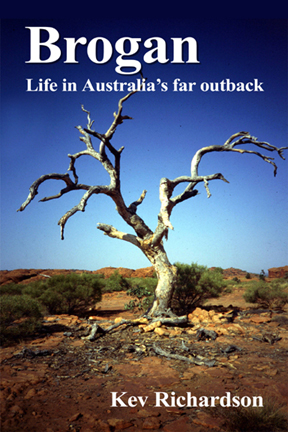
Brogan
Some call Australia the lucky country, land of opportunity, continent of contrasts. All true.
Some call Australia’s people brash, basic and brutally forthright. Also true.
Seventy-five percent of Australians inhabit the temperate southeast crescent, fifteen percent live in the tropical north and but ten percent inhabit eighty percent of this fifth largest continent in the world.
Brogan, born in the drifting sands of corner-country on desert-edge, of drifting parents, his values founded on the rationale of drifting drovers, is of the latter few. The turn of the nineteenth century in the far outback, fifty years after the first historic yet fatal excursion into the vast unknown centre, remained a time of dogged struggle to even survive the conditions. Yet a hard core of men and women braved persistent droughts in their world of heat and sand and paradoxically, periodic floods so widespread that the vast plains became an impassable inland sea.
Of formal education, medical aid, contact with settled parts in those days, there was none. Neighbours lived a hundred miles distant and camels were beasts of burden for supplies as well as trusty ‘steeds’ of transport; no other creature could traverse the waterless terrain.
Brogan the boy, neglected and lonely, discovers life under the patronage of such unlikely mentors as the ‘black nuns’ of the aboriginal mission at Milparinka who ‘mother’ him, the old Afghani camel driver who ‘fathers’ him and a cocky farmer in Queensland’s channel-country who harbours him. Kelly, an aboriginal ‘yellahair’, befriends him. And let’s not ignore, of course, the poxed and grasping Elsie who uses him.
The Brogan story exemplifies the life, trials and tribulations of typical Australians in the unforgiving outback.
5+ Stars! ![]()
![]()
![]()
![]()
![]()
![]()
‘Brogan the boy’, was born into a loveless relationship to the man who sired him. He was looked after by whomever his father found to care for him, as though he were an unwanted pup. If it hadn’t been for Da’oud, the old Arab, he might never have lived to become a man.
Some people are born with a higher sense of self-survival than others, and Brogan learned through his hard knocks just how to meet adventurous head on. This a very sensitive look of an unwanted boy’s growing up and surviving to become ‘Brogan the Man’.
When Amr Brogan first put his hands on a flying machine, he knew who he wanted to be when he became a man. He vowed nothing, and no one would ever stand in the way of his dream. He would do whatever it took to fly a plane. This is the beginning of the Brogan series, and how he became the adventurous man in all the exciting books that follow. This book is definitely a keeper.
…JoEllen, Conger Book Reviews USA
……..***……..
5 Stars! ![]()
![]()
![]()
![]()
![]()
Australia in the early 1900s is a country in transition. Camels still provide the most reliable transport of goods across the wide desert expanses, but the pedal-wireless connects people even on remote cattle stations. Droughts and floods play havoc with the livelihoods of ranchers, yet the discovery of opal brings unimaginable prosperity.
Into this world is born Brogan, son of a drover who wants nothing more for his son than the little he had for himself. Brogan, however, is destined for more than droving…under the influence of an Arab caravan leader, a Catholic nun, a station owner and his wife, even a grizzled camp cook, Brogan the Boy becomes Brogan the Man…a man whose dreams lead him out of the Outback, into Australia’s future.
An exciting read.
Libby Abbott, Aussie eBook Reviews
Note Paperbacks - all titles
- + If in North America, all above is applicable
- + If in Australaia, [email protected]. Greg may have stock and will quote price including mail
- + If in Thailand, [email protected]. Kev will deliver in Chiang Mai, or mail to other areas.
- + If elsewhere, [email protected]. Depending on where you live, Kev may have cheaper prices than from USA, by mailing from his stock in Thailand
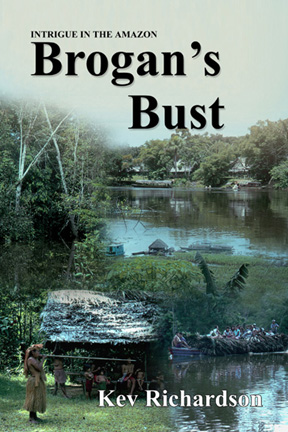
Brogan’s Bust
Colombia and Peru stand tall among countries infested with graft, crime and corruption. They spearhead intrigue in the world’s most politically unstable continent where ruthless crime bosses bludgeon their ways to wealth in land rackets, prostitution, extortion, illegal gem trading, drugs, gun-running and smuggling. Guerrilla bands maraud and butcher their ways to political unrest and in the backwaters of the mighty Amazon, in the disease infested jungle towns on the equator, illicit river traffic is the major industry.
This is the story of an adventurer enmeshed in intrigue. Brogan flies a courier service between remote jungle outposts, each on the very edge of moral propriety where graft and corruption make mockery of the law. Conscientious policemen flounder in the swill of their catch-twenty-two environment when instructed to turn blind eyes to corruption in order to preserve lives and securities.
Among Brogan’s friends are police officers of Colombia and Peru, subservient to corrupt military leaders and together they plot to do no more than upset the smooth running of illicit trades that plague their world. However, they find that intrigue and backstabbing amongst cartel middle men goaded by greed, that their hiccup causes a stumble that generates into a fall to begin a slide to snowball into an avalanche.
The jungle communities in which they operate are havens for those who choose to turn backs on civilisation to live where, in the 1930s they are a thousand kilometres from the nearest road, electric light or telephone.
Into this hot-pot of dropouts from civilisation, stir in schemers and grafters, a novice priest on his founding assignment, the erstwhile upholders of law and order, ethnic Indians who resent the intruders and those who somehow continue to hold a moral faith in an environment that exists largely on moral faithlessness… You soon have simmering, a rich ragout of intrigue, murder, subterfuge, romance and adventure.
5 Stars! ![]()
![]()
![]()
![]()
![]()
Brogan’s Bust by Kev Richardsoncontinues the adventures of the charismatic Brogan, flying charter in the backstabbing world of gun-running, drug-smuggling intrigue in the Amazon jungles.
The tale is a well crafted, high testosterone tale of corrupt international trafficking in gems, guns and drugs. In fact, I couldn’t help but wonder how this author knew so much detailed information about the strong-armed men of South America? It all sounds so realistic, as though he’s been there, done that… and survived.
…JoEllen, Conger Book Reviews USA
……..***……..
5 Stars! ![]()
![]()
![]()
![]()
![]()
Brogan, an adventurer enmeshed in intrigue, flies a courier service between remote outposts of Amazonia where graft and corruption make mockery of the law.
Intrigue and backstabbing amongst cartel middlemen goaded by greed, turn a hiccup into a stumble that generates into a fall, to begin a slide that snowballs into an avalanche.
Come join them, but beware ‘friends’ who seem with you…but are simply waiting for you to turn your back!
Yes, that was South America in the early nineteen hundreds, and later!
Libby Abbott, Aussie EBook Reviews
Note Paperbacks - all titles
- + If in North America, all above is applicable
- + If in Australaia, [email protected]. Greg may have stock and will quote price including mail
- + If in Thailand, [email protected]. Kev will deliver in Chiang Mai, or mail to other areas.
- + If elsewhere, [email protected]. Depending on where you live, Kev may have cheaper prices than from USA, by mailing from his stock in Thailand
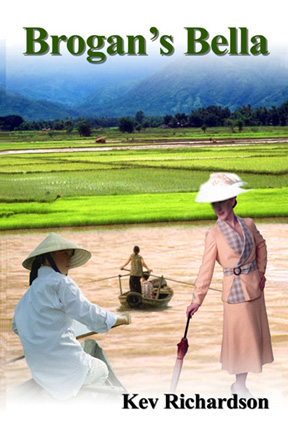
Brogan’s Bella
Brogan met his Isabella Maldonado in Brogan, fell in love with her in Brogans Bust and now brings her to Australia to show her ‘his country’.
This is her story of the journey that took, not the two to three weeks intended, but incarceration in the remote jungles of South-East-Asia, suffering for an indefinite future, the fear, trepidation and yearning that only a hijack can visit on one. They find themselves in the Catch-22 situation of being either embroiled in the cut-throat intrigue of local politics and guerrilla warfare, or facing the cutting of their own throats for even knowing the truths behind the hijack.
The aftermath of the Second World War left South-East-Asia in turmoil, the victorious allies carelessly hasty in ridding themselves of colonial ties in favour of domestic priorities—all, that is, except France. It quickly moved to not only safeguard its French-Indo-Chinese colony but to increase its power in the region.
History has proved that the impetuous haste with which independence was granted by Great Britain to India, Pakistan, Burma and Malaya, by Holland to its Dutch East Indies and by the United States to the Philippines, left each in political turmoil, the bloody aftermath of each still unresolved after sixty years.
France’s re-occupation of Cambodia, Laos and Vietnam proved so bloody even from day one, that within ten years, it conceded defeat to leave those nations in continuing bloody civil wars.
It was into these bubbling cauldrons of intrigue and political unrest that Bella and Brogan, so innocently embroiled, are not only forced to take sides, suffer capture, intimidation and humiliation, but discover sympathies and allegiances to leave the peace of each in as much disarray as the peace of the several innocent nations.
5 Stars! ![]()
![]()
![]()
![]()
![]()
Brogan is at it again. He and his Bella, en-route to Australia, are high-jacked over the Pacific to find themselves doing whatever they must, to survive. I promise you, this book is so full of high adventure and tension it will keep you turning pages—even if you know absolutely nothing about the political situation between Vietnam and France during the 1940’s.
JoEllen, Conger, Conger Book Reviews, USA
……..***……..
Brogan’s and his Bella’s journey back to Australia took not the two or three weeks planned, but incarceration and intimidation, all the fears, suffering and trepidation that only a hijack visits on one.
…so innocently caught up in the catch-twenty-two situation of becoming embroiled in the cut-throat intrigue of jungle politics and guerrilla warfare, or facing the cutting of their own throats for even knowing the truths behind the hijack.
World War Two may have been over for the major world powers, yet the ill-conceived haste with which each rid itself of colonial ties in Asia, consigned every newly independent nation to generations of bloody political and civil war…except maybe France, which re-occupied Indo-China after the Japanese withdrawal, only to drive its three nations even more devastatingly into bloodbaths.
Into such bubbling cauldrons of intrigue and political unrest, Bella and Brogan discover sympathies and allegiances that leave the peace of each in as much disarray as those of the several war-ravaged leading nations.
Libby Abbott, Aussie EBook Reviews
Note Paperbacks - all titles
- + If in North America, all above is applicable
- + If in Australaia, [email protected]. Greg may have stock and will quote price including mail
- + If in Thailand, [email protected]. Kev will deliver in Chiang Mai, or mail to other areas.
- + If elsewhere, [email protected]. Depending on where you live, Kev may have cheaper prices than from USA, by mailing from his stock in Thailand
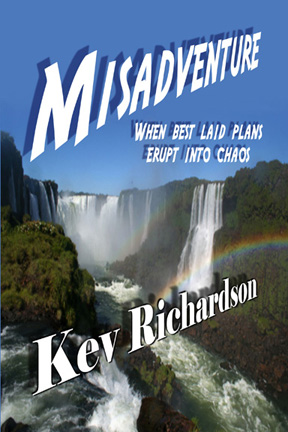
Misadventure
Once again, Brogan is off on a spine-tingling misadventure, this time in South America.
When Peru’s Prime Minister, backed by both his country’s army and popular opinion, took it on himself to stage a coup d’état against his own government, he sacked all his Ministers and declared parliament void. Brogan and Becky simply happened to be there. They didn’t plan on being swept up in the chaos, any more than would you or I if in their shoes.
And this was but one of many hurdles they must best, especially when Colombia’s dreaded FARC struck, having them fighting for their very lives.
Since severing themselves from the yolk of Spain, or Portugal in Brazil’s case, near every South American nation has been plagued by civil wars and deadly disputes with neighbours—usually over territory or minerals. Political insurrections continue even to the present day. There were so many casualties during the nineteenth and twentieth centuries, that even today, women outnumber men by two to one. The people of South America have not only the threat of war constantly upsetting their equilibrium, but organised crime. The entire continent has, for many generations, been so racked in discontent as to be recognised as the world’s most crime-infested—and consequently, the most dangerous for travellers.
Yet it remains a unique magnet to adventurous tourists. It can rightfully boast some of the most alluring natural resources of the planet; highest waterfall, widest and most voluminous waterfall, greatest wildlife wetland, longest and most spectacular mountain range, the least explored jungles still home to primitive tribes, and the incredible realisation that here are millions of people still totally unaware of the rest of the world.
Brogan and Becky find unexpected adventure at every turn. This tale reaches out that readers become involved in both their joys and traumas as a variety of unexpected situations entangle them.
So set aside mundane pursuits and let Becky and Brogan take you with them to share their South American discoveries. They indeed prove it a world of misadventure.
5++ Stars! ![]()
![]()
![]()
![]()
![]()
![]()
![]()
Once again Brogan is off on a spine-tingling misadventure, this time in South America, the kind that makes you lust to travel with him. Multi-published author Kev Richardson has a way of creating his plots so realistically, you feel you are there. He and his Becky hadn’t counted on kidnapping, armed guards, or drug smuggling This is one love story that will keep you turning pages. A must read.
Please follow Kev Richardson’s website to more Brogan adventures.
JoEllen, Conger Book Reviews USA
……..***……..
5 Mighty Stars! ![]()
![]()
![]()
![]()
![]()
Best made plans of even seasoned traveller Brogan can come unstuck in South America. Many become spine-chilling adventures, erupting into chaos, the kind to make you lust to travel with him.
They hadn’t counted on FARC taking hostages – he must move diplomatic mountains to find help.
Peru erupts in revolution…train travel over the Altiplano…a car chase across Paraguay…the Missiones…Iguazzu Falls…was Brogan really smuggling guns into Brazil?
Hey mates, so many disasters fall amongst the thrills of travel in such an unstable part of the world.
Libby Abbott – Aussie eBook Reviews
Note Paperbacks - all titles
- + If in North America, all above is applicable
- + If in Australaia, [email protected]. Greg may have stock and will quote price including mail
- + If in Thailand, [email protected]. Kev will deliver in Chiang Mai, or mail to other areas.
- + If elsewhere, [email protected]. Depending on where you live, Kev may have cheaper prices than from USA, by mailing from his stock in Thailand

